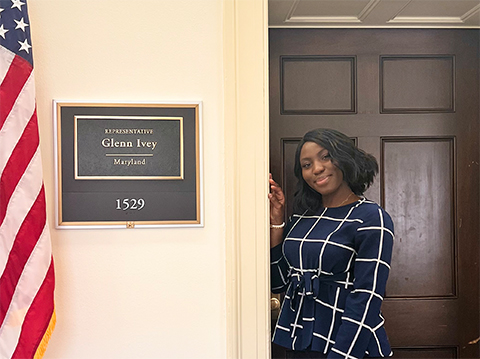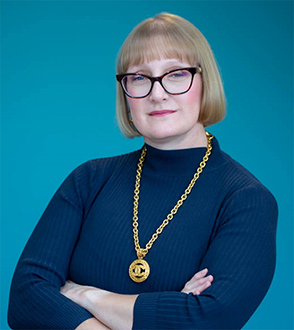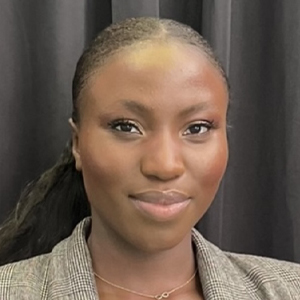
How public policy work amplifies our impact
When I started my doctoral program, I had a clear sense of how my research would contribute to the advancement of science in the medical community. However, I did not know that getting involved with public policy and advocacy efforts would broaden my impact. I hope that sharing my experience will increase awareness of how interwoven policy is into the fabric of advancing science and how we as scientists can augment the impact of our research through advocacy and outreach.

Yvette Seger is the director of strategic scientific program advancement, director of science policy, and deputy director of the Office of Public Affairs at the Federation of American Societies for Experimental Biology. She earned a Ph.D. in genetics from Stony Brook University, working at Cold Spring Harbor Laboratory, and has since been involved in science policy in the private and public sectors.
“Some scientists misconstrue advocacy as lobbying or an unnecessary distraction from research, while others might assume engaging in advocacy requires travel to Washington, D.C.,” Seger said. “In fact, a lot of advocacy happens in your home state because elected officials are ultimately accountable to those who elected them — that’s where the votes are.”
My introduction to science advocacy came through the Society of Women Engineers Capitol Hill Day in 2022. I joined a group of scientists and engineers to advocate for legislation affecting girls’ and women’s education and careers in science, technology, engineering and mathematics.
My next effort, funded by my Ph.D. adviser, was participation in the Public Policy Institute organized by the American Institute for Medical and Biomedical Engineering. This is where I met Seger. She and others shared their experiences and thoughts on the role of public policy in advancing science.
“Every scientist can advocate for increased research funding,” Seger said.

Researchers in academia know that insufficient funding can slow or stifle their progress. Public policies directly influence funding, and who better to share the news about advances in science than the researchers who have firsthand knowledge of the work they do and the funding they need?
Doubling the National Institutes of Health budget, workforce policies that support early-career researchers, and training NIH grant reviewers to reduce implicit bias are just a few of the policies that have been directly impacted by science advocacy, Seger said.
I also learned about the benefits of talking to policymakers about your work and journey as a scientist as a Society of Women Engineers congressional advocate this year. After visiting the office of Senator Chris Van Hollen, D-Md., we received correspondence that the office will cosponsor the STEM ReSTART Act, which supports underrepresented populations rejoining the STEM workforce.
If we limit our activities to the classroom and the lab, we miss opportunities to engage the public in our work and remind nonscientists of the potential of research.
“Recognize that there is more to a career in science than just doing the science,” Seger said. “You need to understand policy at the university level to be good at your job. But scientists also need to know how they are funded. You don’t have to get involved in politics, but you do have to understand that for federal funding there are rules — those rules come into play from Congress, and their opinions could affect funding.”
You can find an advocacy toolkit and information about the Advocacy Training Program, Capitol Hill Day and outreach programs at asbmb.org.
Enjoy reading ASBMB Today?
Become a member to receive the print edition four times a year and the digital edition monthly.
Learn moreGet the latest from ASBMB Today
Enter your email address, and we’ll send you a weekly email with recent articles, interviews and more.
Latest in Opinions
Opinions highlights or most popular articles

Women’s health cannot leave rare diseases behind
A physician living with lymphangioleiomyomatosis and a basic scientist explain why patient-driven, trial-ready research is essential to turning momentum into meaningful progress.

Making my spicy brain work for me
Researcher Reid Blanchett reflects on her journey navigating mental health struggles through graduate school. She found a new path in bioinformatics, proving that science can be flexible, forgiving and full of second chances.

The tortoise wins: How slowing down saved my Ph.D.
Graduate student Amy Bounds reflects on how slowing down in the lab not only improved her relationship with work but also made her a more productive scientist.

How pediatric cataracts shaped my scientific journey
Undergraduate student Grace Jones shares how she transformed her childhood cataract diagnosis into a scientific purpose. She explores how biochemistry can bring a clearer vision to others, and how personal history can shape discovery.

Debugging my code and teaching with ChatGPT
AI tools like ChatGPT have changed the way an assistant professor teaches and does research. But, he asserts that real growth still comes from struggle, and educators must help students use AI wisely — as scaffolds, not shortcuts.

AI in the lab: The power of smarter questions
An assistant professor discusses AI's evolution from a buzzword to a trusted research partner. It helps streamline reviews, troubleshoot code, save time and spark ideas, but its success relies on combining AI with expertise and critical thinking.

